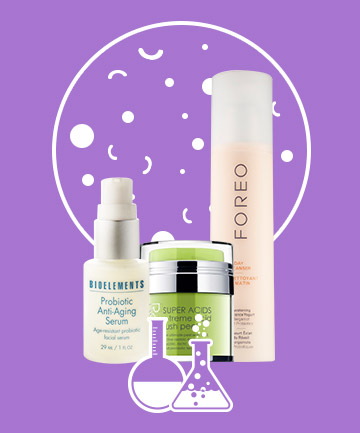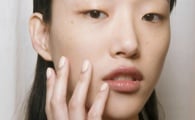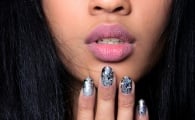Skin Care
Why You Should Be Putting Probiotics on Your FaceYou've been eating probiotics for years. Now it's time to wear them |
You've probably overheard one of your skin care-obsessed pals exalting the wonders of using yogurt as a DIY facial. Maybe your instinct was to call B.S. But recently, research has found that there are actually compelling benefits to the "good bacteria" in yogurt -- beyond what it can do for your insides.
It's well known -- among us health nuts anyway -- that good bacteria, aka probiotics, help fight inflammation in the gut. (That's why we've been chugging all that Chobani.) But new studies indicate that when used in the form of creams, cleansers and masks, probiotics may do something similar for our skin.
When applied topically, probiotics combat the "bad bacteria" living in your skin's ecosystem, says Dr. Craig Kraffert, MD, Amarte Skin Care Dermatologist. Left unattended, bad bacteria may trigger inflammation, causing (and exacerbating) acne, rosacea and eczema. For those suffering from such conditions, probiotics can act as a mini skin-care army.
What some find even more interesting is recent evidence showing probiotics' ability to turn back the clock. "Probiotics have been proven to increase collagen and protein production, as well as improve oxygen intake," says Dr. Neal Kitchen, PhD, a member of the Scientific Board of Advisors for HydroPeptide. "This means more sufficient cell renewal and skin healing." Probiotics also create "a protective shield on the skin's surface, which helps to prevent free radical and environmental damage to stave off skin-aging aggressors." Sound too good to be true?
To be honest, we aren't totally sure it isn't. Read the fine print, and you'll see that most of these products contain probiotic derivatives, as opposed to the active cultures found in yogurt, as it would be difficult to guarantee the shelf life of live bacteria. "Skin care companies are thus exploring formulations with neutralized -- aka, dead -- bacteria," Kraffert explains. "Live bacteria offer more theoretical benefits, as they can interact in real time with resident bacteria and actively secrete beneficial compounds." But Kraffert says neutralized probiotics can still provide real benefits. "How well they work exactly is still an open question," he qualifies.
Game to help find the answer? If you're a skin-care aficionado, science geek, disgruntled rosacea-sufferer or all of the above, give one of these cutting-edge probiotic treatments a try.
SEE NEXT PAGE: Fine Line-Fighting Serum
It's well known -- among us health nuts anyway -- that good bacteria, aka probiotics, help fight inflammation in the gut. (That's why we've been chugging all that Chobani.) But new studies indicate that when used in the form of creams, cleansers and masks, probiotics may do something similar for our skin.
When applied topically, probiotics combat the "bad bacteria" living in your skin's ecosystem, says Dr. Craig Kraffert, MD, Amarte Skin Care Dermatologist. Left unattended, bad bacteria may trigger inflammation, causing (and exacerbating) acne, rosacea and eczema. For those suffering from such conditions, probiotics can act as a mini skin-care army.
What some find even more interesting is recent evidence showing probiotics' ability to turn back the clock. "Probiotics have been proven to increase collagen and protein production, as well as improve oxygen intake," says Dr. Neal Kitchen, PhD, a member of the Scientific Board of Advisors for HydroPeptide. "This means more sufficient cell renewal and skin healing." Probiotics also create "a protective shield on the skin's surface, which helps to prevent free radical and environmental damage to stave off skin-aging aggressors." Sound too good to be true?
To be honest, we aren't totally sure it isn't. Read the fine print, and you'll see that most of these products contain probiotic derivatives, as opposed to the active cultures found in yogurt, as it would be difficult to guarantee the shelf life of live bacteria. "Skin care companies are thus exploring formulations with neutralized -- aka, dead -- bacteria," Kraffert explains. "Live bacteria offer more theoretical benefits, as they can interact in real time with resident bacteria and actively secrete beneficial compounds." But Kraffert says neutralized probiotics can still provide real benefits. "How well they work exactly is still an open question," he qualifies.
Game to help find the answer? If you're a skin-care aficionado, science geek, disgruntled rosacea-sufferer or all of the above, give one of these cutting-edge probiotic treatments a try.
SEE NEXT PAGE: Fine Line-Fighting Serum





































